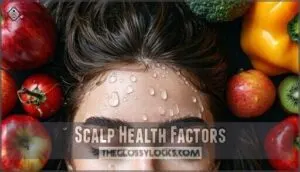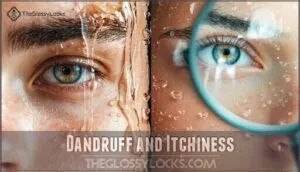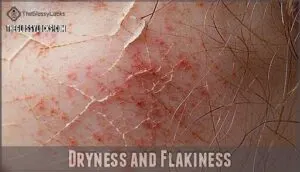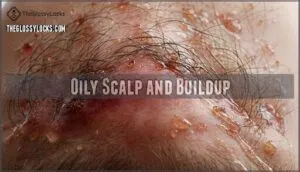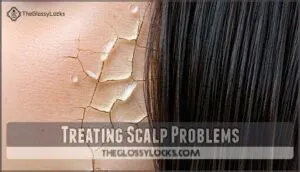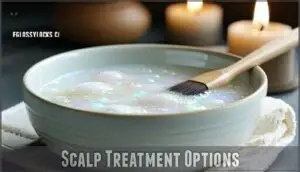This site is supported by our readers. We may earn a commission, at no cost to you, if you purchase through links.
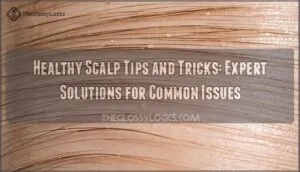 Your scalp’s health directly impacts your hair’s strength, shine, and growth.
Your scalp’s health directly impacts your hair’s strength, shine, and growth.
Start with gentle shampooing based on your hair type—oily scalps need daily cleansing while dry scalps require less frequent washing.
Use lukewarm water and focus shampoo on your scalp, not hair lengths.
Regular scalp massage boosts circulation and removes buildup.
Don’t skip conditioner, but keep it off your roots.
Protect your scalp from sun damage with hats or UV-protection products.
Stay hydrated and eat nutrient-rich foods for internal support.
These healthy scalp tips and tricks form the foundation, but specific issues like dandruff or excessive oiliness require targeted approaches.
Table Of Contents
- Key Takeaways
- Healthy Scalp Importance
- Scalp Health Factors
- Common Scalp Issues
- Treating Scalp Problems
- Scalp Care Essentials
- Maintaining Scalp Health
- Scalp Treatment Options
- Daily Scalp Routine
- Frequently Asked Questions (FAQs)
- How can I improve my scalp health?
- What are the signs of an unhealthy scalp?
- What not to put on the scalp?
- How do I deep clean my scalp?
- Can scalp massage tools replace manual massage?
- How often should I change my pillowcase?
- Does hard water affect scalp health permanently?
- Are scalp serums better than oils?
- When should I see a dermatologist?
- Conclusion
Key Takeaways
- Customize your washing routine – You’ll need daily cleansing for oily scalps, but less frequent washing for dry scalps, using lukewarm water and focusing shampoo on your scalp rather than hair lengths.
- Don’t skip scalp massage and sun protection – Regular scalp massage boosts circulation and removes buildup, while protecting your scalp from UV damage with hats or specialized products prevents long-term damage.
- Address your scalp’s specific needs – You can tackle dandruff with antifungal shampoos, manage dryness with hydrating oils like jojoba, and control excess oil with clarifying treatments twice weekly.
- Support your scalp from within – You’ll see better results when you stay hydrated, eat nutrient-rich foods with omega-3s and protein, and maintain consistent daily care habits rather than relying on quick fixes.
Healthy Scalp Importance
Your scalp is the foundation of healthy hair, housing 100,000 to 150,000 follicles that need proper care to function at their best.
When your scalp stays balanced and nourished, it creates the ideal environment for strong, shiny hair while preventing common issues like dryness, flakiness, and excessive oiliness, which is crucial for maintaining healthy hair.
Role in Hair Growth
Your scalp’s follicle-health foundation directly influences healthy hair growth through essential biological processes.
A healthy scalp maintains ideal blood circulation, delivering nutrients that fuel the hair growth cycle. Well-functioning sebum production protects follicles while proper cell turnover creates the ideal environment for scalp health.
Here’s how your scalp supports hair follicle health:
- Blood Circulation – Nourishes follicles with oxygen and nutrients needed for healthy hair growth
- Follicle Nourishment – Delivers vitamins and minerals directly to hair roots through scalp circulation
- Sebum Production – Creates natural moisture barrier protecting follicles from environmental damage
- Cell Turnover – Removes dead skin cells that could clog follicles and inhibit growth
- Growth Cycle Regulation – Maintains proper phases of hair development and renewal
Impact on Hair Condition
Your healthy scalp is the foundation for stunning hair—it directly determines shine and strength, fullness factors, and damage reduction.
When follicle nourishment thrives through proper oil balance, you’ll notice remarkable improvements in hair growth and overall hair health.
| Scalp Condition | Hair Impact | Visible Results |
|---|---|---|
| Balanced Oil Production | Enhanced shine and manageability | Glossy, vibrant appearance |
| Proper Follicle Nourishment | Stronger hair strands | Reduced breakage and splitting |
| Ideal pH Levels | Improved cuticle health | Smoother texture and bounce |
| Good Blood Circulation | Accelerated hair growth | Increased thickness and density |
Connection to Overall Beauty
Beautiful hair starts with understanding how scalp health directly influences your confidence boost and overall appearance.
When you prioritize scalp care tips, you’re investing in radiant hair that reflects a healthy glow from within.
A youthful scalp creates the foundation for strong, lustrous strands that enhance self-esteem and project energy, making scalp beauty an essential component of your complete wellness routine.
Scalp Health Factors
Your scalp’s health depends on several key factors that work together to create the perfect environment for strong, beautiful hair.
Understanding these influences helps you make better choices for your hair care routine, which is crucial for maintaining strong and healthy hair.
Genetics and Diet
Why does your genetics matter for scalp health? Your genetic predisposition determines how your scalp responds to different conditions and treatments.
Diet plays an equally vital role, as nutritional deficiencies in essential vitamins can disrupt your scalp microbiome and overall health.
A healthy diet rich in nutrients supports ideal scalp function, while personalized nutrition addresses specific needs based on your genetics and overall health.
Stress and Hormones
Your body’s stress response directly affects your scalp through cortisol impact and hormonal imbalances.
When stress levels spike, your body produces excess cortisol, which can disrupt normal hair growth cycles and trigger scalp issues like dryness and flakiness.
Here’s how stress and hormones influence scalp health:
- Cortisol overload – High stress increases cortisol production, leading to inflammation and weakened hair follicles
- Hormonal shifts – Medication effects and natural hormone changes can alter oil production and scalp sensitivity
- Stress management – Regular diet influence through proper nutrition supports hormone balance and healthy scalp function
Environmental Influences
Your scalp faces daily environmental challenges that can dramatically affect its health.
Your scalp battles pollution, UV rays, and harsh weather every single day.
Air pollution deposits harmful particles that clog follicles, while UV rays damage both scalp skin and hair follicles.
Weather extremes disrupt your scalp’s natural balance, creating the perfect storm for irritation.
As explained by experts, extreme temperatures weaken hair cuticles, leading to breakage and scalp issues.
| Environmental Factor | Impact on Scalp | Protection Strategy |
|---|---|---|
| Sun Exposure | UV damage, dryness, follicle harm | Use scalp sunscreen, wear hats |
| Pollution Impact | Clogged pores, inflammation | Gentle cleansing, antioxidant products |
| Water Quality | Product buildup, mineral deposits | Install water filters, clarifying shampoos |
Protecting your scalp environment requires understanding these threats.
Hard water leaves residue that suffocates follicles, while pollution creates oxidative stress.
Your scalp protection strategy should include regular hydration and barrier repair to maintain healthy scalp health.
Common Scalp Issues
Your scalp can develop several frustrating issues that affect both comfort and hair appearance. Understanding these common problems helps you choose the right treatment approach and maintain healthy scalp health.
Dandruff and Itchiness
Nearly half of all adults deal with dandruff at some point, and you don’t have to suffer through the flakes and itchiness. Understanding what triggers these symptoms helps you target effective solutions for lasting scalp comfort.
Don’t let dandruff control your confidence—effective solutions exist for lasting scalp comfort.
Recent studies have shown that microbiome imbalances can substantially contribute to dandruff.
Here’s how to tackle dandruff control and scalp itchiness:
- Target Malassezia control with antifungal shampoos containing ketoconazole or selenium sulfide
- Restore scalp microbiome balance through gentle cleansing and avoiding over-washing
- Use anti-itch ingredients like colloidal oatmeal or peppermint oil for immediate relief
- Apply soothing scalp masks weekly with exfoliation frequency that removes buildup without irritation
Dryness and Flakiness
Harsh winter weather can turn your scalp into a flaky mess.
Unlike dandruff caused by yeast, dry scalp results from insufficient sebum production or a weakened skin barrier. The eczema connection means some people face extra vulnerability during cold months.
Ceramides benefit your scalp by restoring moisture barriers, while product overload strips natural oils. Simple hydration methods include gentle cleansing and scalp-specific moisturizers containing jojoba or aloe vera for lasting relief, providing a way to restore the natural oils.
Oily Scalp and Buildup
Oily scalp occurs when your sebaceous glands produce excessive sebum, often influenced by hormonal changes and genetics.
Product buildup from styling products compounds the problem, creating a breeding ground for bacteria and fungi.
Managing oily scalp requires strategic cleansing frequency and proper techniques:
- Use clarifying shampoo twice weekly to remove stubborn product buildup
- Increase scalp cleansing to 5-6 times weekly for ideal oil control
- Incorporate scalp exfoliation weekly to prevent pore-clogging buildup
Treating Scalp Problems
When scalp problems strike, you don’t have to suffer through the discomfort or embarrassment.
With the right approach and targeted treatments, you can restore your scalp’s health and get back to feeling confident about your hair.
Flaky Scalp Remedies
Flaky scalp troubles often stem from fungal overgrowth or dehydration.
Natural Exfoliants like salicylic acid remove 90% of dead cells, while Hydrating Masks reduce flaking by 40%.
Oil Treatments with coconut oil cut dandruff severity by 55%.
For targeted relief, consider using a specialized shampoo.
Ketoconazole shampoos eliminate fungus causing scalp flakes.
Consider Dietary Changes and Professional Advice for persistent scalp psoriasis or severe dry scalp remedy needs.
Itchy Scalp Solutions
Scalp irritation often stems from identifying triggers like harsh products, weather changes, or stress-induced inflammation.
Combat discomfort with soothing ingredients such as aloe vera, tea tree oil, or oatmeal-based treatments for immediate itchy scalp relief.
Lifestyle adjustments including gentle shampooing, avoiding tight hairstyles, and managing stress levels support scalp soothing.
Coconut oil offers relief by moisturizing and soothing irritation, providing immediate relief for an itchy scalp.
Consider medical treatments for persistent issues.
Dry Scalp Treatments
When your scalp feels tight and flaky, you’re dealing with compromised scalp barrier function.
Hydrating oils like jojoba and argan penetrate deeply, while ceramides benefits include restoring moisture retention.
Gentle exfoliation removes dead skin without irritation.
Humectant ingredients attract water to your scalp, boosting scalp hydration. Essential oils provide soothing relief for dry scalp conditions.
Addressing this requires effective dry scalp solutions, which can offer dry scalp treatments to help alleviate the issue.
Oily Scalp Management
While dry scalp needs moisture, an oily scalp requires sebum control through strategic cleansing.
Use a clarifying shampoo with salicylic acid to dissolve product buildup. Double wash helps remove excess sebum without triggering hormonal influence on oil production.
Diet impact matters—reduce dairy and sugar. Wash every other day, applying shampoo ingredients like zinc or tea tree to manage scalp oiliness effectively.
Scalp Care Essentials
Your scalp needs the same level of care as your facial skin to maintain healthy hair growth and prevent common issues like dryness, flakiness, and irritation.
Simple daily habits like gentle shampooing, regular exfoliation, and proper nutrition can transform your scalp health and boost your hair’s appearance, which is essential for overall healthy hair growth.
Gentle Shampooing
Choosing the right shampoo makes all the difference for scalp health.
Gentle, sulfate-free shampoo protects your scalp’s natural oils while providing thorough cleansing. Use lukewarm water and massage with fingertips using circular motions.
Here’s what your scalp craves:
- Freedom from harsh chemicals that strip away protective oils
- Soothing massage techniques that boost circulation and relaxation
- Consistent cleansing routine that maintains healthy scalp balance
Exfoliation and Massage
Weekly scalp exfoliation removes dead skin cells and product buildup that can clog follicles.
Use gentle scrubs with sugar or salt, massaging in circular motions for several minutes. This scalp stimulation boosts circulation, delivering nutrients to hair follicles.
DIY scrubs work well, but avoid over-exfoliating. Regular massage techniques enhance blood flow, promoting healthier hair growth naturally.
Balanced Diet and Hydration
What you eat directly impacts your scalp’s health and appearance.
Poor nutrition creates vitamin deficiencies that weaken hair follicles, while proper hydration benefits overall scalp function. Your body needs adequate protein intake and healthy fats for ideal nutrient absorption and scalp nutrition.
- Consume omega-3 rich foods like salmon and walnuts to nourish your scalp
- Drink 8-10 glasses of water daily to maintain proper hydration levels
- Include iron and zinc-rich foods to support healthy hair growth
- Eat protein sources like eggs and lean meats for strong follicles
Maintaining Scalp Health
Once you’ve established good cleansing habits, maintaining scalp health becomes straightforward with consistent protective measures.
You’ll need to focus on three key areas: proper washing techniques, sun protection, and avoiding products that cause irritation or damage.
Regular Washing and Rinsing
Your washing frequency affects scalp health more than you’d think.
Wash hair 5-6 times weekly to prevent product buildup and maintain scalp cleanliness.
Use sulfate-free shampoo with warm water—hot temperatures strip natural oils, causing dryness.
Double shampooing removes stubborn buildup effectively, and rinse thoroughly to prevent clogged follicles.
Proper hair washing techniques guarantee your healthy scalp stays balanced and nourished.
Protecting From Sun Damage
Your scalp faces the same UV threats as your skin, making sun protection essential for healthy scalp maintenance.
Sunburn prevention starts with proper coverage and targeted products.
Here’s how to shield your scalp from UV hair damage:
- Wear protective headwear – Choose wide-brimmed hats or caps that cover your entire scalp, especially if you have thinning hair or exposed areas.
- Apply scalp SPF products – Use scalp sunscreen types designed specifically for hair areas, applying them directly to your part lines and any visible scalp.
- Style strategically – Consider hat hair styles that work with protective headwear, or use scarves to cover exposed scalp areas during peak sun hours.
Remember that UVA radiation changes hair color.
Avoiding Harsh Chemicals
Chemical overload frequently damages your scalp’s delicate balance.
Choose sulfate-free shampoos with natural ingredients instead of harsh formulas containing parabens and silicones. Your scalp thrives when you avoid aggressive chemical treatments and embrace gentle styling methods.
| Harmful Chemicals | Better Alternatives | Benefits |
|---|---|---|
| Sulfates | Sulfatefree shampoo | Preserves natural oils |
| Synthetic dyes | Natural dyes | Reduces irritation risk |
| Parabens | Plant-based preservatives | Gentler on sensitive skin |
| Ammonia perms | Heat-free styling | Prevents chemical burns |
| Bleaching agents | Highlighting techniques | Maintains scalp integrity |
Ingredient awareness protects your scalp from unnecessary damage while maintaining healthy hair growth.
Scalp Treatment Options
When scalp problems persist despite your best efforts, you’ll need targeted treatment options that address the root cause.
Professional solutions and specialized products can restore your scalp’s health more effectively than basic care routines alone.
Natural Remedies and Oils
Mother Nature’s pharmacy offers powerful solutions for scalp wellness.
Essential oil benefits include rosemary for circulation and tea tree for antimicrobial action.
DIY scalp masks using coconut oil and honey provide deep nourishment.
Jojoba oil mimics natural sebum, while Ayurvedic scalp care incorporates neem for natural dandruff control.
These herbal scalp treatments using natural ingredients deliver gentle yet effective results.
Medicated Shampoos and Serums
When seeking prescription strength relief, medicated shampoos and serums offer targeted solutions for stubborn scalp conditions.
These specialized scalp treatments contain key ingredients proven to combat seborrheic dermatitis effectively:
- Selenium sulfide – reduces flaking by 75% within 28 days
- Salicylic acid – controls scaling and itching symptoms
- Ketoconazole – eliminates fungal overgrowth causing irritation
These shampoos are a popular scalp treatment.
Apply these scalp serum formulations twice weekly, massaging into affected areas for 1-3 minutes before rinsing to maximize treatment duration and minimize potential side-effects.
Professional Treatments and Consultations
When home remedies fall short, dermatologist consultation becomes essential for persistent scalp problems.
These specialists use trichoscopy and advanced scalp diagnosis techniques to identify underlying causes.
Trichologists offer specialized scalp evaluation services, while dermatologists prescribe targeted medications and perform in-office procedures like corticosteroid injections.
Advanced therapies provide medical advice for complex conditions, utilizing the expertise of dermatologists and scalp diagnosis techniques.
Daily Scalp Routine
Building a consistent daily scalp routine creates the foundation for healthy hair growth and prevents common issues before they start.
You’ll need morning care, weekly treatments, and monthly deep cleaning to maintain ideal scalp condition year-round, which is crucial for healthy hair growth.
Morning and Nighttime Care
Your scalp works around the clock, so tailor your scalp care routine to match its daily rhythm.
Morning cleanse removes overnight buildup, while nightly nourish prepares follicles for repair and growth during sleep.
- Start mornings with gentle scalp massage using fingertips to boost circulation
- Apply scalp serum before breakfast to deliver nutrients throughout the day
- Use silk scarves or pillowcases at night to reduce friction and moisture loss
- Try overnight treatments like preshampoo oils for deep conditioning while you sleep
- End evenings with pre-bed massage to release tension and stimulate blood flow
Weekly Exfoliation and Massage
Once weekly, give your scalp exfoliation benefits through gentle scrubs containing sugar or salt.
These DIY scrubs remove buildup while boosting circulation. Apply massage techniques using fingertips in circular motions for several minutes.
Increased blood flow can further enhance results. Product selection matters—choose scalp-specific formulas over harsh alternatives.
This scalp care routine enhances scalp health by stimulating blood flow and clearing dead skin cells effectively, promoting overall wellbeing.
Monthly Deep Cleaning and Conditioning
Beyond weekly maintenance, your scalp deserves monthly deep cleaning and conditioning sessions to combat stubborn buildup.
Deep Cleanse Benefits include removing accumulated dead skin cells and product residue that regular washing misses.
Massage cleansing oils into your scalp two hours before shampooing, then follow with scalp scrubs containing salicylic acid.
This scalp detox process unclogs follicles, promoting healthier hair growth.
Finish with deep conditioning hair masks enriched with ceramides for maximum Scalp Hydration and protection.
Frequently Asked Questions (FAQs)
How can I improve my scalp health?
Massage your scalp with fingertips during washing, use gentle sulfate-free shampoos, exfoliate weekly, moisturize with natural oils like jojoba, and protect from sun damage with hats.
What are the signs of an unhealthy scalp?
When your crown isn’t cooperating, you’ll notice telltale warning signs that demand attention. Watch for persistent itchiness, flakiness, redness, or unusual hair shedding that signals your scalp needs help.
What not to put on the scalp?
Don’t apply harsh chemicals, sulfates, alcohol-based products, or essential oils directly without diluting them. Avoid fingernails when washing, tight hairstyles, and over-washing which strips natural oils.
How do I deep clean my scalp?
Double-shampoo your scalp using gentle, circular motions with your fingertips. Use a clarifying shampoo to remove buildup, then follow with a scalp scrub containing sugar or salt for weekly exfoliation.
Can scalp massage tools replace manual massage?
Tools can enhance your scalp massage but they can’t fully replace the intuitive pressure and technique of your fingertips. You’ll miss the personal touch that adapts to your scalp’s needs.
How often should I change my pillowcase?
You should change your pillowcase every two to three days to prevent oil, dirt, and bacteria buildup that can clog pores and irritate your scalp, leading to breakouts and inflammation.
Does hard water affect scalp health permanently?
Like a rain cloud that eventually clears, hard water’s effects aren’t permanent.
Hard water doesn’t cause permanent hair loss, and changing products or updating your water system can reverse the effects.
You can restore your scalp’s health using clarifying shampoos and water softeners.
Are scalp serums better than oils?
Scalp serums typically penetrate deeper than oils, delivering targeted ingredients like peptides and vitamins directly to follicles.
However, oils excel at moisturizing and creating protective barriers.
Your scalp’s specific needs determine which works better, as the choice between serums and oils depends on the individual’s scalp needs.
When should I see a dermatologist?
Picture your scalp as a smoke detector going off – persistent itching, flaking, redness, or hair loss that doesn’t improve with proper care signals it’s time to see a dermatologist for professional evaluation.
This sentence is a complete concept and does not require further separation.
Conclusion
Paradoxically, the most complex scalp problems often have the simplest solutions.
You don’t need expensive treatments when consistent care works better.
These healthy scalp tips and tricks create lasting results through daily attention to basics.
Your scalp responds to gentle handling, proper nutrition, and protection from environmental damage.
Remember that patience pays off—healthy changes take time to show.
Start with one or two strategies, then build your routine gradually.
Your hair’s future depends on today’s scalp care choices and making informed decisions about your daily routine, which is crucial for a healthy scalp.
- https://www.tiktok.com/tag/headspa
- https://www.instagram.com/mandybthairapy/?hl=en
- https://bridgettehill.com/
- https://www.hilarispublisher.com/open-access/the-impact-of-environmental-pollution-on-hair-health-and-scalp-disorders-112343.html
- https://www.news-medical.net/health/Whate28099s-living-on-your-scalp-The-emerging-science-of-the-scalp-microbiome.aspx

